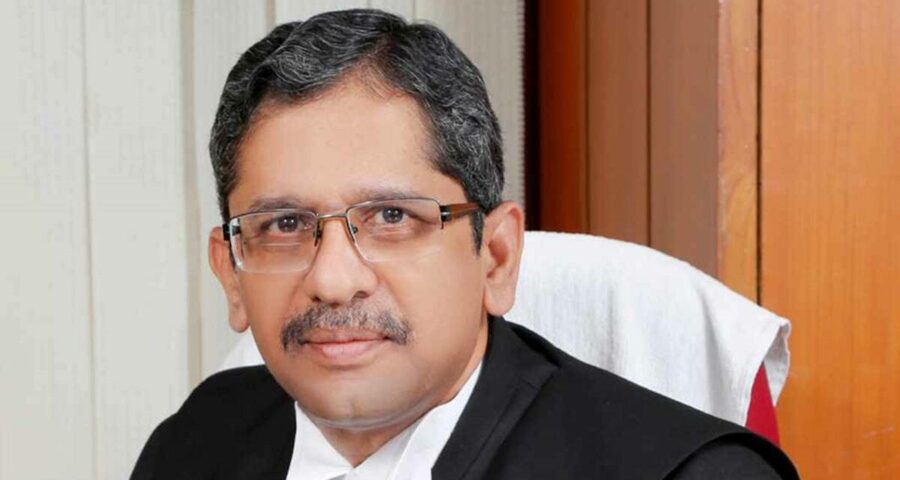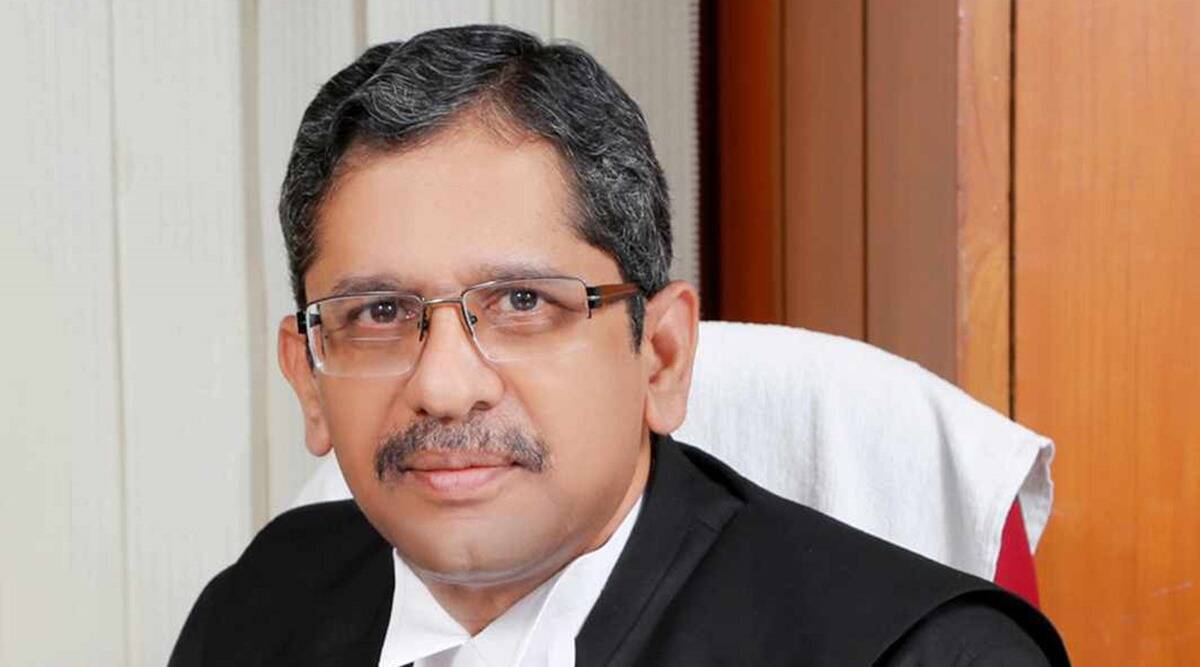While underlining that judges cannot stay “in ivory castles”, he said they “have to be mindful of the fact that the noise” amplified on social media “is not necessarily reflective of what is right and what the majority believes in”.
Noting that “the mere right to change the ruler, once every few years, by itself need not be a guarantee against tyranny,” Chief Justice of India NV Ramana, quoting legal scholar Julius Stone, said Wednesday that “elections, day-to-day political discourses, criticisms and voicing of protests” are “integral to the democratic process”.
While underlining that judges cannot stay “in ivory castles”, he said they “have to be mindful of the fact that the noise” amplified on social media “is not necessarily reflective of what is right and what the majority believes in”.
Delivering via virtual mode the 17th Justice P D Desai Memorial Trust lecture, organised by the Praleen Trust, on the ‘Rule of Law’, CJI Ramana said that in the 17 general elections since Independence, “the masses have performed their duties reasonably well” and now it is “the turn of those who are manning the key organs of the State to ponder if they are living up to the Constitutional mandate.”
“It has always been well recognised that the mere right to change the ruler, once every few years, by itself need not be a guarantee against tyranny… The idea that people are the ultimate sovereign is also to be found in notions of human dignity and autonomy. A public discourse, that is both reasoned and reasonable, is to be seen as an inherent aspect of human dignity and hence essential to a properly functioning democracy,” he said.
On the need to ensure independence of the judiciary for maintaining the rule of law, the CJI said: “The judiciary cannot be controlled, directly or indirectly, by the legislature or the executive, or else the rule of law would become illusory. At the same time, judges should not be swayed by the emotional pitch of public opinion either, which is getting amplified through social media platforms. Judges have to be mindful of the fact that the noise thus amplified is not necessarily reflective of what is right and what the majority believes in.”
“The new media tools that have enormous amplifying ability are incapable of distinguishing between right and wrong, good and bad, and the real and fake. Therefore, media trials cannot be a guiding factor in deciding cases. It is, therefore, extremely vital to function independently and withstand all external aids and pressures. While there is a lot of discussion about the pressure from the executive, it is also imperative to start a discourse as to how social media trends can affect the institutions… The above, however, should not be understood as meaning that judges and the judiciary need to completely disassociate from what is going on. Judges cannot stay in ‘ivory castles’ and decide questions which pertain to social issues,” he said.
After more than 70 since Independence, he said, when the “entire world is facing an unprecedented crisis in the form of Covid-19,” it is at this juncture that “we necessarily have to pause and ask ourselves, as to what extent we have used the rule of law to ensure protection to and welfare of all of our people.”
“I do not intend to provide an evaluation of the same. Both my office and my temperament prevent me from doing so. But I began to feel that this pandemic might be a curtain-raiser to much larger crises in the decades to come. Surely, we must at least begin the process of analysing what we did right, and where we went wrong,” he said.
Emphasising the four principles of the rule of law, the CJI said the first principle embodies that “laws must be clear and accessible”.
“This is the fundamental point that when laws are expected to be obeyed, the people at least ought to know what the laws are. There cannot therefore be secretive laws, as laws are for the society.”
“Another implication of this principle is that they should be worded in simple, unambiguous language,” he said.
Enlisting the third principle which guides rule of law, members of society, he said, have the “right to participate in the creation and refinement of laws” that regulate their behaviours.
“We live in a democracy. The very essence of a democracy is that its citizenry has a role to play, whether directly or indirectly, in the laws that govern them. In India, it is done through elections, where the people get to exercise their universal adult franchise to elect the people who form part of the Parliament which enacts laws… In the 17 national general elections held so far, the people have changed the ruling party or combination of parties eight times, which accounts for nearly 50 per cent of the number of general elections.”
“In spite of large scale inequalities, illiteracy, backwardness, poverty and the alleged ignorance, the people of independent India have proved themselves to be intelligent and up to the task. The masses have performed their duties reasonably well. Now, it is the turn of those who are manning the key organs of the State to ponder if they are living up to the Constitutional mandate,” he said.
Source: Read Full Article


